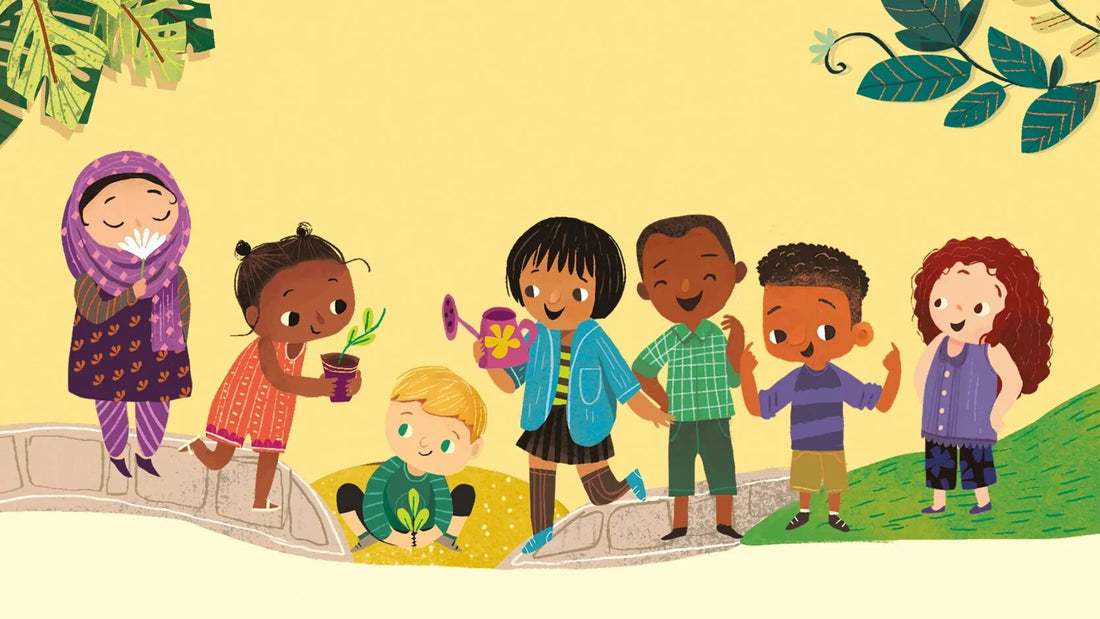How to talk to children about racism
Author Katie Daynes and anti-racism educational charity Show Racism the Red Card explain why it’s important to talk to children about racism, give tips on answering tricky questions and discuss how we can work with children to stop racism.
Why do we need to talk about racism?
Events over the last few years have made it abundantly clear that racism is NOT a thing of the past. To stamp it out we need everyone to recognise WHAT it is, to understand WHY it’s wrong and to learn HOW to challenge it in our own communities.
But do we really need to talk to young children about it?
Yes. By the age of two, children begin to notice skin colour and other differences in appearance. They begin to see who looks and sounds like them and who doesn’t. And they begin to form their own world view, which is largely shaped by the comments and attitudes of those closest to them. As parents, carers and educators, it’s up to us to explain that it’s OK to notice differences, and even to celebrate them, but that we’re all part of the same race – the human race – and that we should all have the same opportunities in life.
Can’t we just talk about fairness without mentioning the word racism?
That would definitely help, but it wouldn’t solve the problem. Unfortunately, racism is something so deep-rooted that many people don’t even recognise their own biases, prejudices and false assumptions. Racism can be tackled at all ages, but the younger people are when they learn to spot racism – and recognise just how mean and unfair it is – the less likely they are to be racist themselves and the better they’ll be at sticking up for others. Even very young children can experience racism. We need them to know that what’s happening to them is unfair and unacceptable – and that there are people they can turn to for help.
So where do we start?
As parents, carers and educators, it’s important to start by being honest with ourselves about our own potential biases. Often these are unconscious, so we may need to dig deep to recognise them. Try to learn more about other cultures in your own community and be wary of stereotypes. If you approach the topic of racism with honesty and openness, you’ll be in a better position to help children talk about it too.
Should we introduce the conversation, or wait for it to come up?
It’s best to talk through things as they arise. You can’t explain racism in a single conversation, but relating it to specific examples can help increase awareness. Some children might use racist words they’ve picked up from friends, without understanding the power behind them. It’s important for us to react quickly and to explain gently but firmly how offensive or hurtful a specific word can be.
Encourage children to see the world from other people’s points of view and to ask themselves what’s kind and what’s unkind; what’s fair and what’s unfair. How would they feel if they were in that situation or if someone treated them in that way? Racism is so inherently UNFAIR, it’s likely to prompt a lot of questions, and that’s a good thing. The more children question the world around them, the more they challenge the injustices they see and hear, and the closer we get to ending racism.
But what if we can’t answer their questions?
That’s OK. It’s fine to admit that some of the questions surrounding racism are really difficult to answer. Books like ‘What is racism?’ are a useful tool to help you explore questions together. You could read a question and talk about it first, before opening the flap to read the answer below.
If you’re struggling to answer a question about a specific ethnicity or religion or tradition, you could research it together. It’s good to teach children the process of finding out information and checking its accuracy. They need to know that there’s a lot of misinformation out there and that not everything they’re told is true. If in doubt, be open-minded and assume that there’s more than one side to a story.
Shouldn’t we encourage children to ignore difference because we’re all the same deep down?
It’s often better to focus on what we have in common rather than what sets us apart, but that doesn’t mean we should ignore our differences. A person’s family history and traditions can be an important part of their own identity and should be respected. In an increasingly multicultural world, children have a wonderful opportunity to learn from each other and to adopt a more rounded, inclusive world view. You can increase children’s exposure to diversity by attending a range of events or choosing a diverse range of books and films to look at together. Help them to discover that our differences are what make us special, and that this is a good thing.
How do we explain Black Lives Matter when ALL lives matter?
Here, children may need some context so they can understand the inequalities that already exist in the world. You could give examples of how badly Black people were treated in the past, from being banned from the best beaches (South Africa under Apartheid) or being told to give up their bus seat for a white person (segregation in the USA and Rosa Parks’ act of defiance), to being enslaved – kidnapped from their own country and forced to work in horrible conditions (transatlantic slave trade). Explain how many people still start off life at a disadvantage because of what’s happened historically – and how they’re often still treated unfairly today. A simple, modern example could be how a Black child is more likely to be told off in class and seen as a troublemaker, whilst a white child acting the same way might just be called ‘lively’ or ‘excitable’. To ensure that everyone has the opportunity to be the best they can be, people have to stop treating Black people unfairly in the first place!
How can we work with children to stop racism?
As you talk to children about racism, emphasise that it’s a learnt behaviour and that it doesn’t have to be this way. We all get things wrong at times, and that’s OK, so long as we own up to our mistakes and try to do better next time. Recognising racism is the first step, but to STOP it we need to be actively ANTI-racist – call it out, report it, let others know things have to change. Racism is everyone’s problem to solve. If we stamp it out in everything we do, we can stop it forever.

